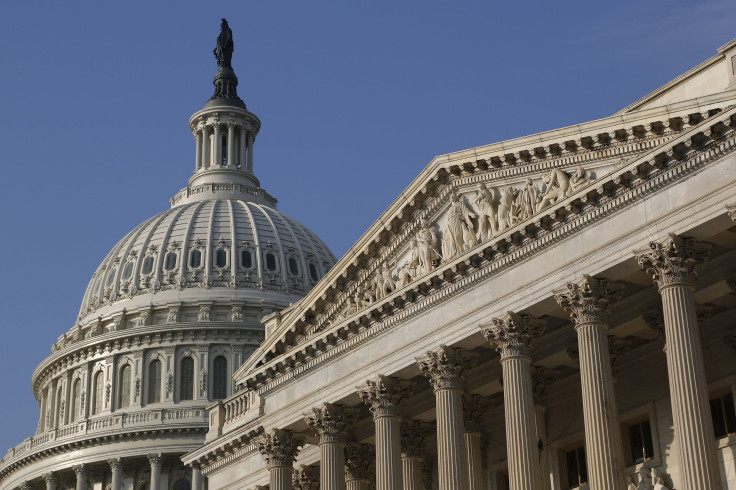President Obama, Congress Show No Signs Of Budget Compromise

WASHINGTON -- If the White House was hoping Republicans on Capitol Hill would wait a day or even a few hours before declaring the president's latest budget dead, they were quickly met with disappointment. The $4 trillion proposal that lays out the spending and tax items he discussed during the State of the Union address was quickly declared dead on arrival in Congress.
“President Obama promised in the State of the Union to deliver a budget filled with ‘ideas that are practical, not partisan,’” Senate Majority Leader Mitch McConnell said. “Unfortunately, what we saw this morning was another top-down, backward-looking document that caters to powerful political bosses on the left and never balances -- ever.”
But the administration doesn't appear to be ready to throw its hands up and start warming up the veto pen just yet. “If they have other ideas for how we can keep America safe, grow our economy, while helping middle-class families feel some sense of economic security, I welcome their ideas,” Obama said. It's the start of a negotiation, the White House argued.
"Just because they're against it now, doesn't mean they will be against it," White House press secretary Josh Earnest said of congressional Republicans at a briefing with reporters on Monday. He pointed to the high-income tax increases House Republicans passed two years ago as part of a package to avoid the fiscal cliff.
It's a pretty rosy view for an administration that thus far has shown no sign of finding common ground with Congress, which unlike the time members passed tax increases is now entirely controlled by Republicans. Obama’s decision to sign a series of executive orders that legalized 5 million undocumented immigrants proved only to incense Republicans.
Obama is talking about plans for spending in the 2016 fiscal year, which begins in October, but Congress still hasn't finished figuring out how to fund the government for the current year. Funding for the Department of Homeland Security expires at the end of this month and the GOP has decided to wed keeping the agency open with trying to stop Obama's immigration executive orders. Obama has said he won't sign anything to undo his immigration actions. The bill probably won't even be able to make it out of the Republican-controlled Senate.
As politicians in Washington like to say, budgets are each side's opportunity to express values and priorities. They are road maps, not written in stone. But if there is any chance of a bill passing both chambers and being signed by the president, a significant negotiations will be necessary.
There are some places they may be able to find common ground. The president’s proposal increases funding for the Veterans Administration, a frequent concern of Republicans. It addresses the impending lack of funds in the Federal Highway Trust Fund. And both sides want to get rid of the sequestration limits set to go back into effect next year.
But while they may share some goals, how they get there likely will present several insurmountable hurdles. Obama relies heavily on tax increases and a rewriting of the tax code that eliminates loopholes. Republicans have insisted they won’t raise taxes, and any closing of loopholes must accompany reduced rates for the affected companies.
Unlike some previous budgets, Obama didn't appear to offer Republicans any olive branches. Nowhere did he include an opening offer on overhauling the nation's entitlement system, a top priority for Republicans who argue significant changes to Social Security and Medicare need to be implemented.
Then there are the nonstarters on both sides. Republicans have already ruled out passing Obama's proposal to provide free community college for high school graduates across the country. He recommends cutting the Overseas Contingency Fund, the pot of money that has been used to fund rebels in Syria and aid those resisting Islamic State fighters.
Obama bolsters the near-bankrupt Highway Fund by forcing American companies that are keeping profits overseas to return them and pay taxes on them. Republicans take a very different approach to repatriation and want a tax holiday that would allow multinational corporations to return their profits to the U.S. without paying any taxes at all, arguing that will bolster the economy.
Congressional Republicans haven't released their budgets yet, but they surely will include things to which Obama never would agree, like repealing his signature Affordable Care Act. The House is going to vote this week to repeal the law -- again. This time is a little different versus the last more than 50 times they tried since Republicans now control the Senate, too, but it still has the same chance of actually happening. None.
And those are just the big things. A budget document contains thousands of provisions that deal with a litany of programs and spending priorities. There are hundreds of programs and funds and cuts and increases where both sides are likely to find disagreement.
It may be that trying to pass a budget and get it signed by the president is impossible. Washington has operated for years without one, but that is what has prompted the deadline-driven method of funding the government that resulted in a government shutdown. The lack of a budget won't necessarily mean another shutdown. But if everyone can come together on a budget, it's the best bet to keep the federal government from grinding to a halt once again.
© Copyright IBTimes 2025. All rights reserved.






















